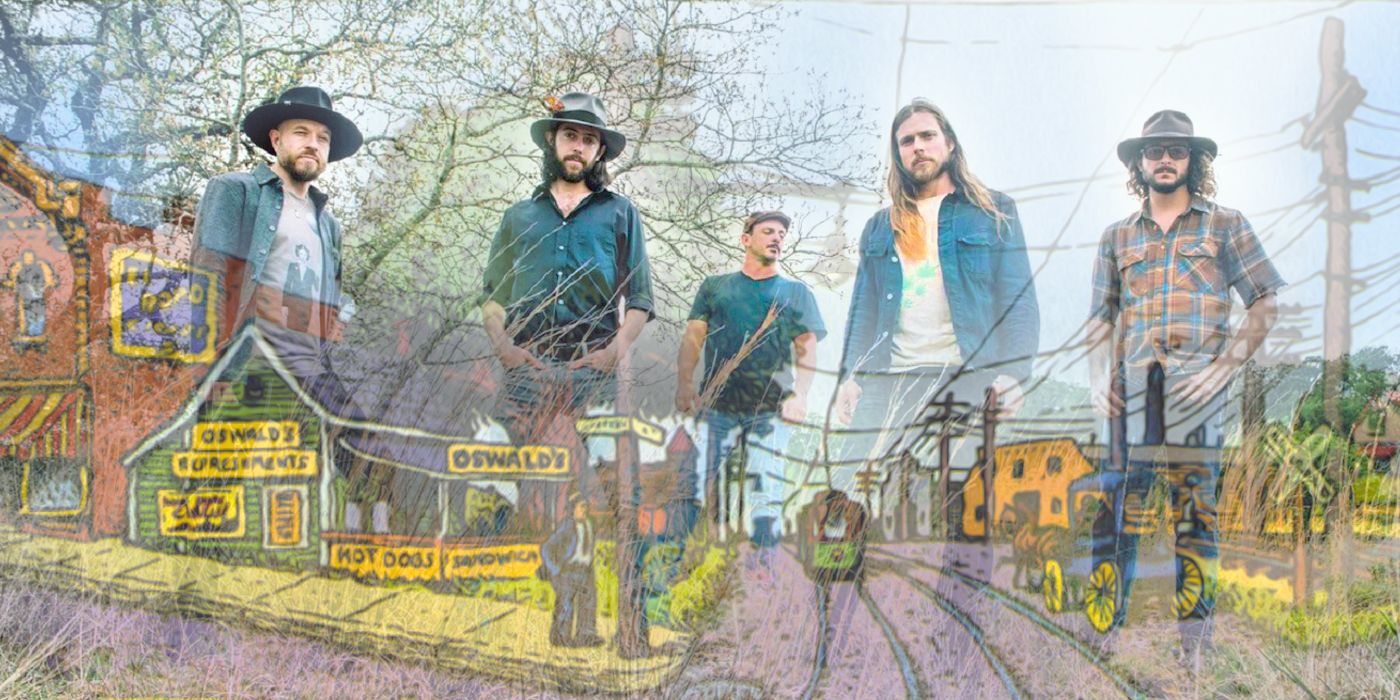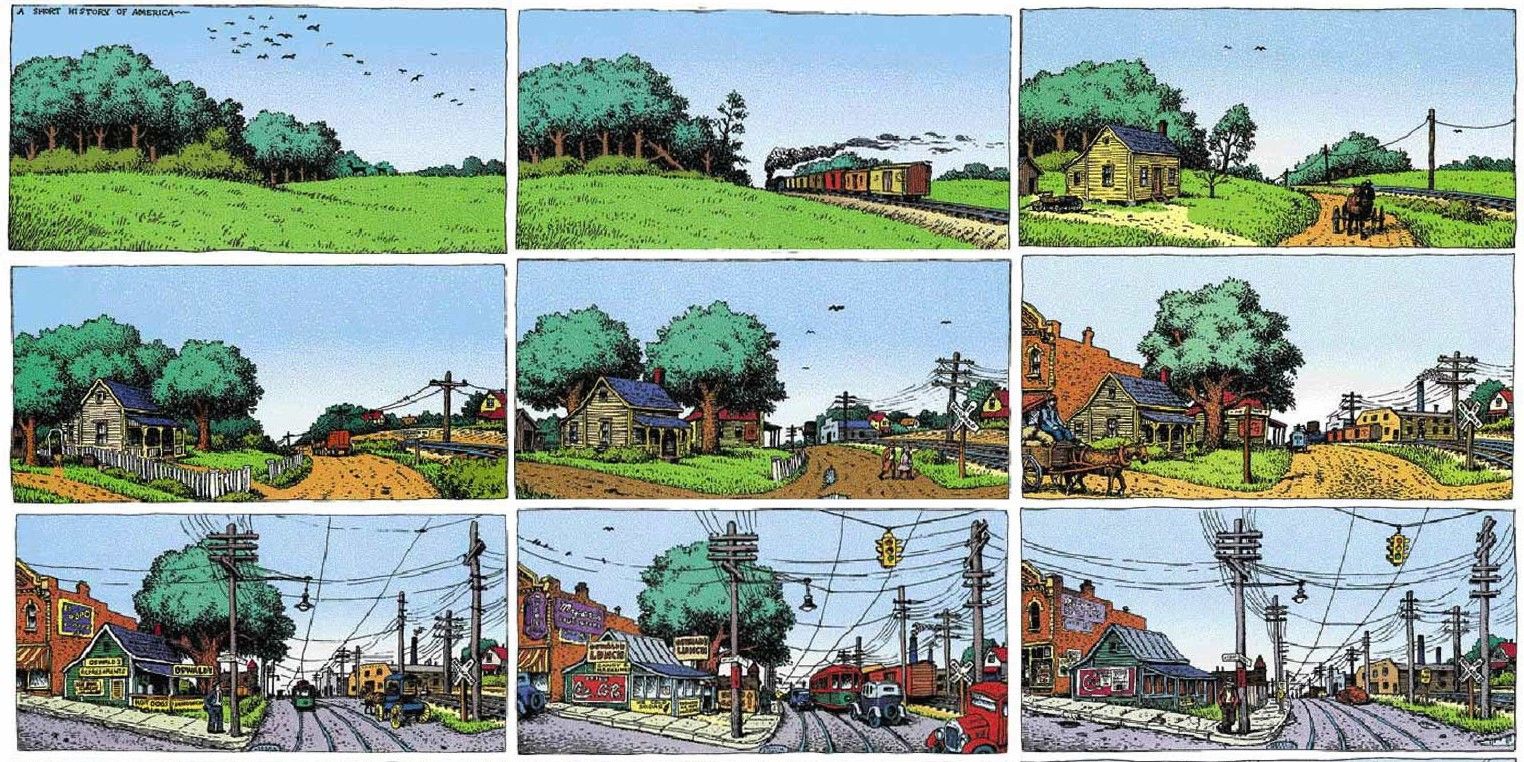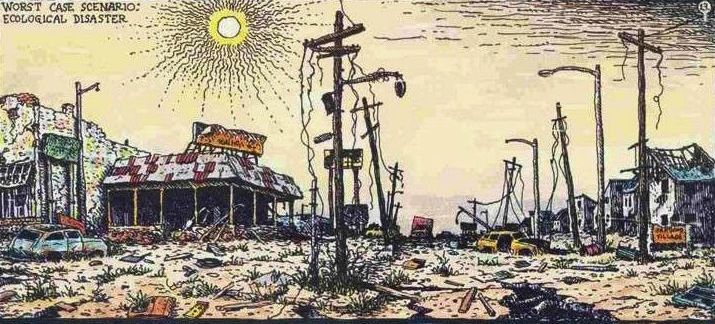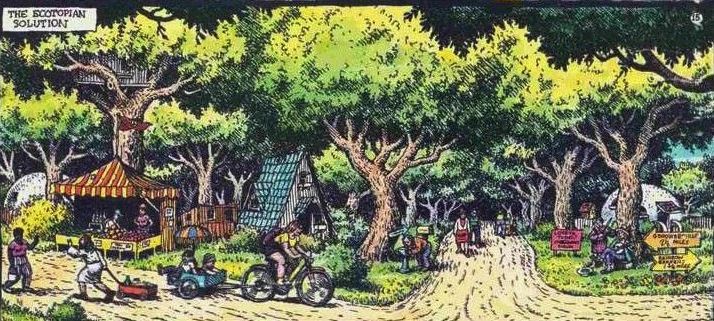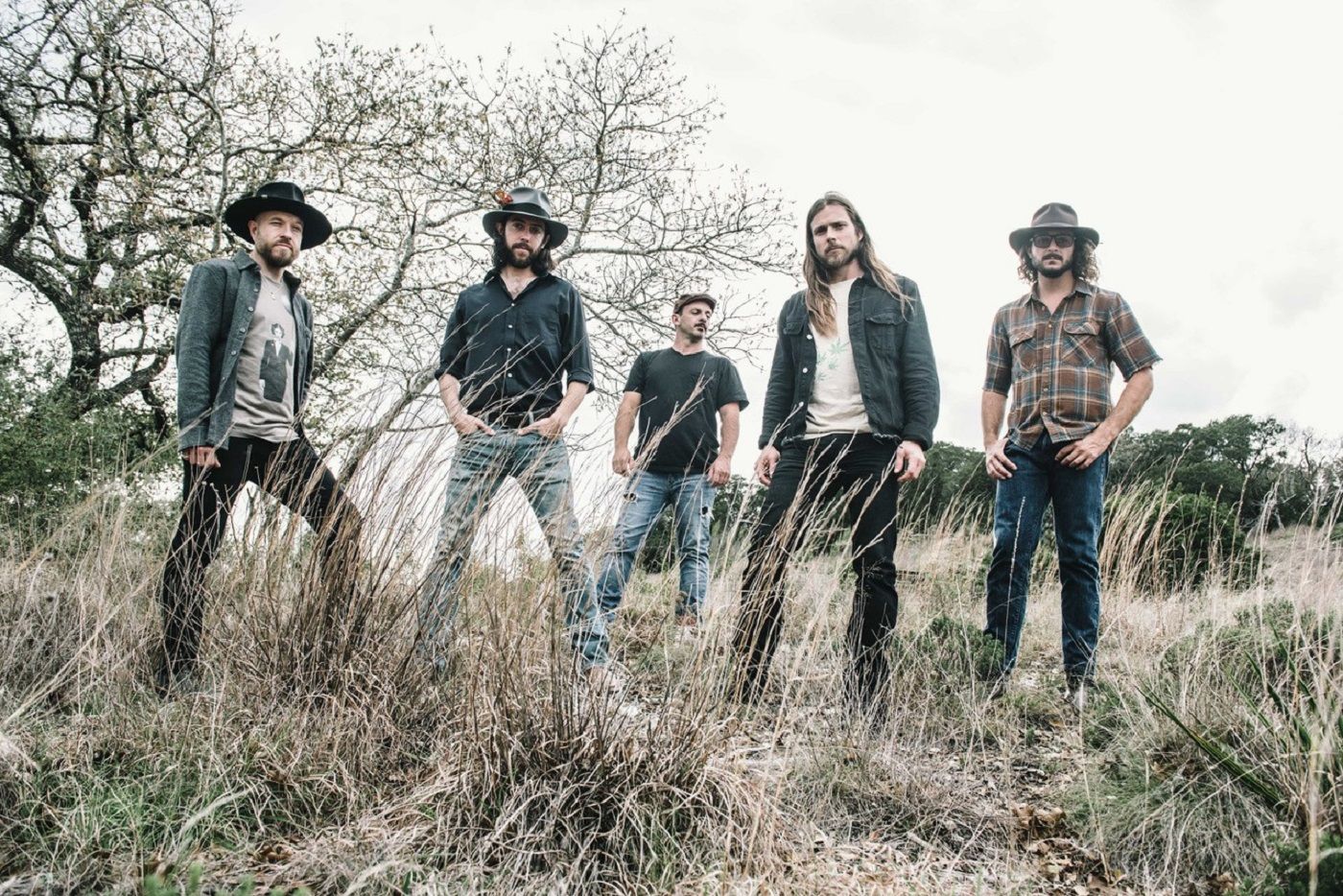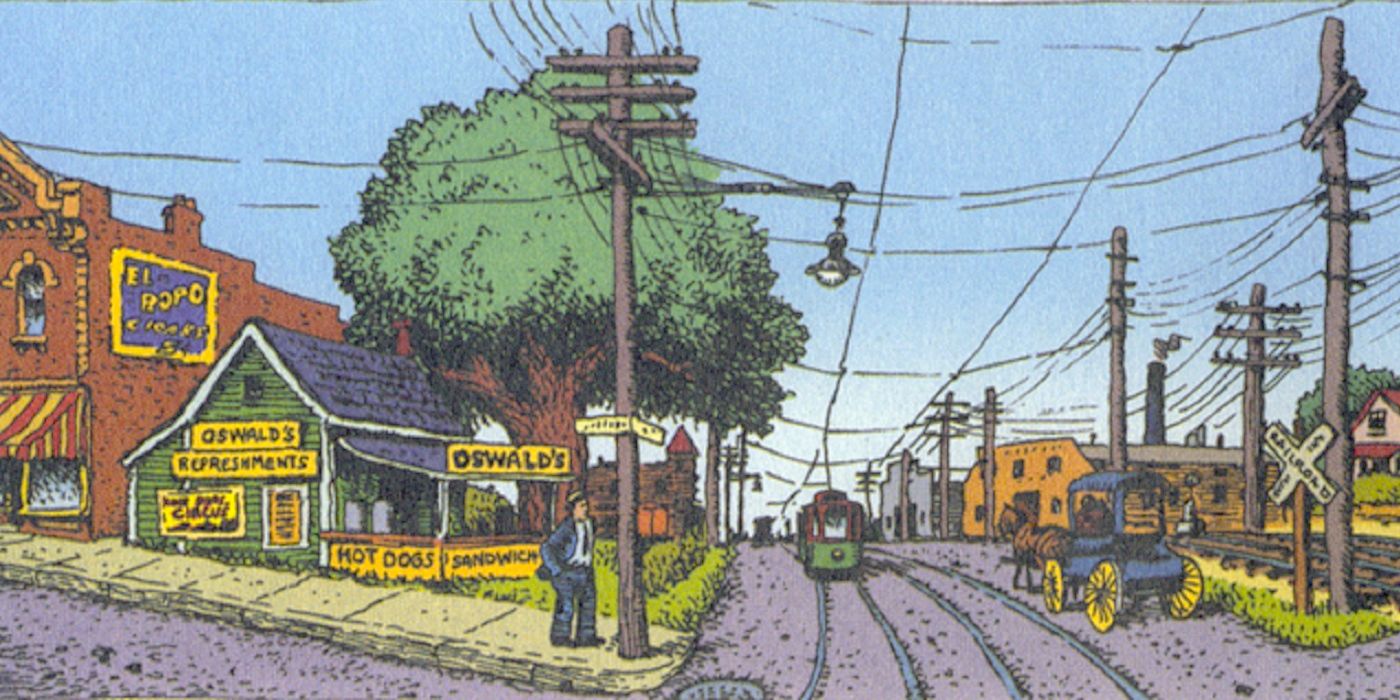R. Crumb’s sequential strip A Short History of America first appeared in 1979, and in the decades since has become an iconic series of images representing the nation’s urban transformation and subsequent decay. The original black and white piece has undergone transformations of its own over the years, evolving from a magazine feature to a colored poster, and later supplemented with additional panels. Now, Crumb’s strip has evolved further by way of Lukas Nelson & Promise of the Real’s animated video for a new version of their song "Civilized Hell," which showcases Crumb’s A Short History of America images.
For the uninitiated, Lukas Nelson & Promise of the Real is a California-based five-piece country/rock group that has served as the backing band for Canadian rock veteran Neil Young, both on tour and in the recording studio. Nelson also co-wrote and co-produced the soundtrack for Lady Gaga and Bradley Cooper's 2018 remake of A Star is Born, in which the entire band also co-starred.
A Civilized Hell, Visualized
Crumb’s piece chronicles the American countryside’s descent from pristine grassy hills into dirty urban concrete cities, albeit with modern conveniences. The group’s song "Civilized Hell" likewise acknowledges the disadvantages and consequences of modern progress, making Crumb’s visuals a fitting corollary to the song, and a natural accompaniment for the band’s video.
"There’s an interesting genesis to this," Nelson told CBR. "When I was around 19 years old, I was given a book called The Monkey Wrench Gang. The book was illustrated by R. Crumb. I took a lot of inspiration from that book and wrote the song 'Civilized Hell' upon finishing it. That was around 12 years ago, now."
The Monkey Wrench Gang was originally written by Edward Abbey in 1975, and told the story of a group of environmental activists’ efforts in the American southwest during the country’s counterculture movement. A subsequent reissue of the novel 10 years later included new illustrations by Crumb, whose underground comix of the 1960s were strongly associated with that same counterculture era.
"I tend to align with ideals that don’t fall easily on one side of the aisle or the other," says Nelson. "I’m passionate about small family farms and their importance, for example, so in that way you could say that I’m for counterculture, if the culture we are referring to is the mass consumerist culture that values quantity over quality with devastating environmental practices. But I would say I’m more for creating local demand than trying to regulate industry with more government. Less government is better in my opinion, I’m a proponent of local initiatives. I believe in taking care of the planet, but I’m more practical. If you cut down a tree, plant 10 more."
Nelson was inspired to contact Crumb for permission to use A Short History of America in the song’s video, as well as to see if animation could be added. Crumb agreed, supplying all 15 panels of the piece for use in the video. The animation was provided by the marketing agency Beautiful Digital.
The Evolution of Crumb’s Piece
When first published in an ecologically focused magazine called CoEvolutionary Quarterly in 1979, A Short History of America consisted of 12 black and white panels. The first panel was a timeless image of a lush, unspoiled countryside, and each panel subsequently showed the addition of modern industrialization and advancements, such as railroads, dwellings and automobiles. The increasingly congested progression leads to the final panel, bleakly illustrating an urban street corner clogged with traffic, utility lines and overdevelopment. The foreboding words “What next?!!” conclude the original piece, and "Civilized Hell" echoes the closing mood of Crumb's original strip.
"I think it’s more of a cautionary tale of what may happen," Nelson says. "I don’t want to live in an assembly line world where we’ve depleted our resources and the corporate world uses new technology to gather all of our data and share it with the government. Efforts like Citizens United have unified government and corporate interests. Democrats and Republicans are all bought and paid for. Better to build a new world from the bottom up, I think."
Crumb’s work saw its first change two years later, when the 12 panels were reformatted as a poster sold through Kitchen Sink Press, with colors added by Peter Poplaski. A decade or so later, Crumb augmented the strip with three additional panels serving as a sort of epilog to the original piece, with each postulating a different answer to his “What next?” question. The 13th panel is the most dire and perhaps the most likely extrapolation of the original work, captioned “Worst case scenario: Ecological disaster,” showing the evolved landscape now devastated by an unknown natural calamity.
The other two panels, though, paint more joyful and optimistic scenarios. "The fun future: Techno fix on the march!" shows a cleaner and happier futuristic interpretation of the same landscape. “The ecotopian solution” forecasts a more harmonious merging of man and nature, perhaps prognosticating an eventual balance between what had once existed and what had replaced it.
What Next?
Lukas Nelson & Promise of the Real’s video for "Civilized Hell" is another chapter in A Short History of America’s evolution. The video begins, and concludes, with an overview of Crumb’s entire 15-panel piece. Unlike past incarnations of the work, though, the video re-sequences the panels throughout the song, to uniquely illustrate the progression differently for each verse. Each of the song’s first three verses concludes with the chorus, “Hopin’ she don’t die in a civilized hell,” where the video then somberly overlays Crumb’s “Ecological disaster” panel.
The video ends on a more optimistic note, however, come the song’s final verse and fade, focusing on Crumb’s “Fun future” and “Ecotopian solution” images. The video also juxtaposes Crumb’s images with historic video snippets showing industrial and technological advances, such as television, farming equipment and modern assembly lines.
"I think there’s a lot of hope, yes," says Nelson. "We have many minds now who are sitting at home, coming up with ideas on how to make a better world."
"Family farmers are actually at the forefront of these movements," Nelson continued, "And many have banded together to created networks of distribution, and people can now get their food directly from a farm near them, in most areas of the country. Many of your readers, I would guess, are well equipped intellectually for the challenge as well.
"First, we need to be able to feed ourselves and our families, though. We have to safely get back to work," Nelson said regarding the current coronavirus (COVID-19) global pandemic. "My heart goes out to those who are sick right now and who’ve lost their loved ones, and to the many more who are struggling mentally with how to cope with not being able to provide for themselves and their loved ones.
"They should know they are not alone, and never give up."
A Short History
A previous fan-made, non-animated video took Crumb’s original colored 12-panel piece and set it to Joni Mitchell’s "Big Yellow Taxi." Mitchell’s 1970 song is known for the refrain, “They paved paradise, put up a parking lot.” The video is not believed to be authorized by Crumb, and has no connection to the group or "Civilized Hell," but it does show the resonance with which the piece affects those looking to create; not a new phenomena for the artist.
R. Crumb -- born Robert Dennis Crumb -- initiated the birth of the underground comix scene with the publication of Zap Comix in 1968. The comic was the first to feature Crumb’s most iconic work -- the oft-seen “Keep on Truckin’” one-page strip that was the source of the image featured on countless bootlegged items ranging from belt buckles to mud flaps throughout the 1970s. Seventeen issues of Zap Comix were sporadically published through 2016. Crumb is also responsible for other comics and characters such as Fritz the Cat, Motor City Comics, and Home Grown Funnies among others.
Son of legendary country musician Willie Nelson, Lukas Nelson is not without his own legacy. Forming Promise of the Real in 2008, the band released a live recording the next year, followed by their first eponymously titled studio album in 2010. The original version of "Civilized Hell" debuted on last year’s Turn Off the News (Build a Garden), the band's fifth album. A follow-up companion album, Naked Garden, was released on March 27 and contains two new versions of the song -- an acoustic rendition, and the alternate version featured in the video.
"It’s an honor for me that Mr. Crumb chose to provide the visual companionship to my song," Nelson concluded. "However it lives on is subject to everyone’s interpretation of the art itself. Suffice it to say, I’m grateful!"
Lukas Nelson & Promise of the Real's releases Turn Off the News (Build a Garden) and Naked Garden are available from Fantasy Records.

